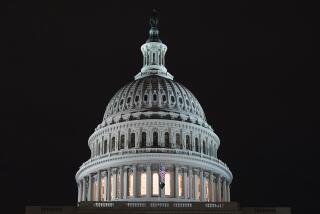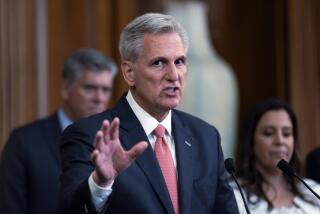Bipartisan deficit talks turn to budget caps while Democrats push for ending tax breaks
Deficit-reduction talks between the White House and congressional leaders focused on budget caps Wednesday, even as Democrats seek to put attention on a “long list” of tax breaks that could be eliminated to raise new revenue.
Vice President Joe Biden convened negotiators for the second day this week as both Democrats and Republicans hope to reach a resolution by July 1. That would be a month before an August deadline to raise the $14.3 trillion federal debt limit, a signal to jittery financial markets that Washington is serious about tackling its debt problem.
The group is expected to resume talks Thursday, when the discussion will return to the thorny issue of Medicare spending, which is driving much of the nation’s deficit, as well as other entitlement programs.
“There’s a path forward, but we’ve got a long way to go,” said Rep. Chris Van Hollen of Maryland, a negotiator for House Democrats. “There are still a lot of impediments to reaching a final deal.”
Treasury officials have said if additional borrowing capacity is not approved by Aug. 2, the nation would face an unprecedented default on federal obligations, an outcome both sides are trying to avoid.
Both sides have indicated an interest in potentially setting budget caps to rein in future deficits, but deep differences remain in the details. Republican say caps should apply only to spending, while Democrats say revenues should be allowed to be raised to meet budget goals.
Republicans want to extract steep spending cuts on par with the amount of new borrowing – about $2.4 trillion would be need to cover bills through next year--and no new taxes.
But Democrats insist new revenue should be part of any agreement. “We put a whole menu of options,” Van Hollen said. “Getting rid of oil and gas subsidies, getting rid of special tax breaks for corporate jets, private jets--a whole range of tax earmarks.”
More to Read
Get the L.A. Times Politics newsletter
Deeply reported insights into legislation, politics and policy from Sacramento, Washington and beyond. In your inbox three times per week.
You may occasionally receive promotional content from the Los Angeles Times.






